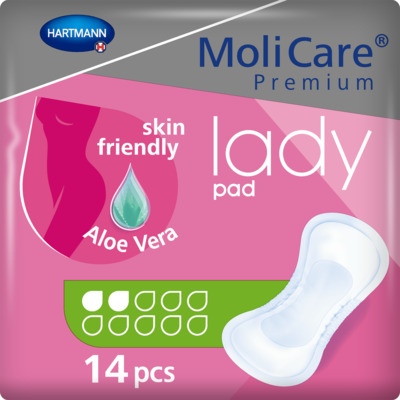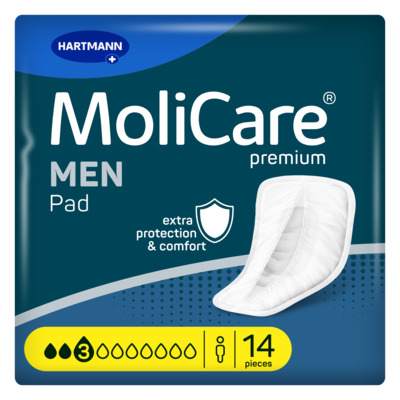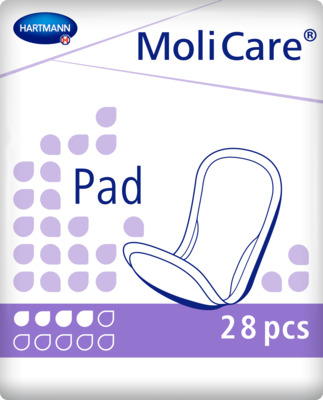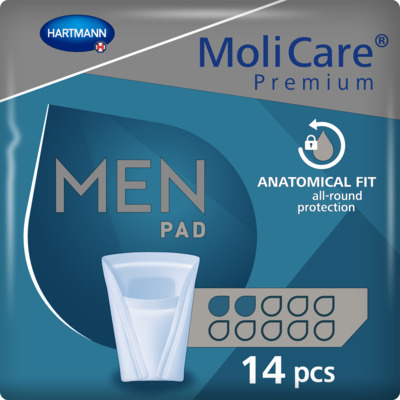Incontinence Advice
How Anxiety Affects Your Bladder and Bowel
Can anxiety make you wee more? Anxiety induced bowel movements and bladder issues can be embarrassing, but they can be controlled. If you are worried about having an accident, especially when you're out in public, try MoliCare pads for urine leaks or incontinence pants to help contain bowel leaks. Read more in the following article which explains how anxiety affects your bladder and bowel.

How anxiety affects your bladder and bowel
- How Does Anxiety Cause Bladder and Bowel Problems
- Common Anxiety-Related Bladder and Bowel Issues
- Frequent Urination
- Irritable Bowel Syndrome
- Symptoms of Anxiety Bladder and Bowel Issues
- How To Treat Anxiety Bowel Movements and Bladder Issues
- Incontinence Products
- Lifestyle Changes - HD Paragraph Image
- Resources
- Talking Therapies
- Medication
- Sources
How Does Anxiety Cause Bladder and Bowel Problems?
People who feel stressed or anxious often find themselves having to use the toilet urgently more often. This is because stress triggers a response in our body that discharges stress hormones into the bloodstream. There, they travel to specific spots in the body to cause certain physical, emotional and psychological changes and increase the body’s ability to deal with a potential threat. Often, this stress response is known as the fight or flight response since the body is preparing to fight the possible threat or flee from it.
The stress response can trigger other reactions in the body too. For example, stress can cause the muscles to tighten. This will help protect the body against any injury the potential threat may cause. However, the abdomen muscles can also tighten in this process, leading to an increased urge to urinate or defecate. Also, tightened muscles due to a stress response can cause brief muscle control issues, interfering with our voluntary muscle control. These muscle control interferences can affect the muscles in charge of urination and bowel movements, leading to a more frequent urge to use the toilet and even accidents when the person can’t get to the bathroom in time. The fight or flight response usually kicks in when people feel nervous, threatened, or afraid. Although it usually only occasionally affects our bladder and bowel, the stress response’s inception can become a frequent issue for those with anxiety4.
Common Anxiety-Related Bladder and Bowel Issues
Although anxiety can cause several issues with the body, there are a couple of problems that it can cause concerning the bladder and bowel.

Frequent Urination
Frequent urination, when you need to go to the toilet more than usual during 24 hours is a common symptom of anxiety disorder. Since most people go to the toilet 6-7 times a day, frequent urination is usually considered to be urinating more than 7 times in 24 hours, as long as 2 litres of fluid has been consumed that day5. Frequent urination can affect anyone, including children, and can be controlled with assistance from a GP. Although frequent urination can be a common symptom of other physical changes, like pregnancy, it can also indicate more severe health conditions such as diabetes or prostate problems6.
It can be worrying that you might not reach to toilet before you empty your bladder, if that is something you are concerned about, MoliCare incontinence pads for adults can provide a solution to prevent leaks onto underwear and clothing.
We have useful posts about:
Irritable Bowel Syndrome
Irritable bowel syndrome (IBS) affects up to 20% of the population at some point in their life and is one of the most common gastrointestinal complaints. Although it isn’t clear exactly how stress, anxiety and IBS are connected, studies have proven that they can occur together. Experts believe that it is a result of the stress reaction in the body. Typical symptoms of IBS include recurring diarrhoea or constipation, plus stomach pain and nausea, which are evident in some people. People with IBS often experience a few weeks or even months between symptoms, though anxiety-induced IBS reoccurs during times of stress or worry[vii]. Read more about bowel incontinence here>>
Symptoms of Anxiety Bladder and Bowel Issues
Since many health issues can include your bladder and bowel, it’s important to make an appointment with your GP if you’re experiencing these problems rather than self-diagnose them. However, several symptoms can indicate you are suffering from an anxiety-related bladder or bowel issue.
These include:
|
|
This exaggeration of the bladder or bowel control can occur frequently or rarely and often accompanies an escalation of other anxiety symptoms. Unfortunately, the severity, timing and intensity of the loss of bladder or bowel control varies from person to person and often from day to day. Because of this, any bladder or bowel issues must be diagnosed by a health professional.
How To Treat Anxiety Bowel Movements and Bladder Issues
Although anxiety bowel movements and bladder issues are embarrassing and uncomfortable, there are plenty of ways a GP can help. If your GP determines that your symptoms are due to anxiety, there are preventatives and treatments they may recommend. Some of these treatments such as a bladder training will help relieve anxiety, thus relieving the cause of bowel and bladder issues.
Knowing how to stop nervous bowel movements, how to stop anxiety urination, or deal with any other symptoms you may be experiencing is the first step in tackling the issue. Your anxiety bowel movements and bladder issues can be under control in no time.
Incontinence Products
Although incontinence products aren’t a treatment for anxiety bowel movements, and bladder issues, they can help you manage your symptoms while you wait to hear from your doctor or to start treatment. MoliCare® have a range of slim discreet pads for men and women which can provide an extra layer of protection from accidents on a day to day basis, reducing the risk of incidents in public and helping you get a restful nights sleep.
At MoliCare® we stock a wide range of discreet incontinence products, specifically designed to give you confidence and protection when you need it the most. With the focus on discretion and total protection, our high quality, disposable incontinence products provide exceptional comfort and dryness for all levels of bladder weakness and incontinence.
Our recommendations:
- Women with a few drops of urine we recommend MoliCare® Lady Pads available in 1 to 5 drop absorbency, we recommend trying a 3 Drop.
- Men with a few drops of urine we recommend MoliCare® Men Pads available in 2 to 5 drop absorbency, we recommend trying a 4 Drop.
You can order a sample of these pads free of charge to try for yourself at home.

Lifestyle Changes
Making some changes to your lifestyle can improve symptoms of bladder and bowel issues, regardless of their cause. Some lifestyle changes your health professional may suggest include:
- Regular exercise
- Reducing caffeine intake
- Altering how much fluid is drunk a day
- Consuming a high-fibre diet
- Avoiding stress triggers
- Quitting smoking9

Resources
Self-help resources are often the first treatment a GP will offer since they are available quickly and can help relieve anxiety at a personal pace. Your GP may recommend several self-help resources for anxiety or bladder and bowel issues, including workbooks and online courses. Often, these resources are based on cognitive behavioural therapies, helping you control anxiety and any symptoms that it causes. The resources provided may allow you to work through them independently, or your GP may put you on a course with other people who experience similar difficulties. Read a dedicated article about ways to reduce the symptoms of incontinence.
Alternatively, a support system called Reading Well will help you support and manage your health through helpful reading. All of their books are recommended by health experts and people who have experienced the health conditions they discuss, and you don’t need a recommendation from a doctor to use their suggested books.
Sign up to our mailing list for your 15% discount code
Talking Therapies
Another treatment your GP may offer is a talking therapy from mental health professional. Aimed at helping ease symptoms of anxiety and panic, these therapies provide you with a safe space to talk about any difficulties you are experiencing with anxiety bowel movements or bladder issues. There are two types of talking therapy that your doctor may recommend for anxiety, and these are:
- Applied Relaxation Therapy – This involves utilising mind and body exercises to reduce your nervous system anxiety and its symptoms in the moment. Some relaxation techniques involved include sustained deep breathing, guided imagery, systematic desensitisation, and progressive muscle relaxation.
- Cognitive Behavioural Therapy – This focuses on the idea that your thoughts, attitudes and beliefs affect your behaviour and feelings. Furthermore, it explores the notion that negative thoughts and feelings can trap you, worsening anxiety and other issues. Cognitive Behavioural Therapy provides healthy ways of dealing with overwhelming problems by changing negative patterns.
Medication
There are several medications your GP may prescribe to help with anxiety bowel movements, or bladder issues, depending on your issue. However, a doctor will only offer medication to manage symptoms, and your GP should offer you other treatment routes. Some medications you may receive are:
- Antidepressants – There are several types of antidepressants that you may receive. The most commonly prescribed medication for anxiety is a selective serotonin reuptake inhibitor, which increases serotonin levels in the brain. However, you may also receive desipramine, a commonly prescribed antidepressant for bladder issues.
- Pregabalin – Pregabalin can treat epilepsy as well as anxiety, and it works by stopping your brain from releasing the chemicals that cause anxiety.
- Anti-Diarrhoea medication – Antidiarrheal drugs slow down the bowel movement to decrease the number of bowel movements and the urge to defecate.
- Anticholinergics – Used to treat urge incontinence, anticholinergics come in many forms and can calm an overactive bladder. 10-11
Get In Touch with Your GP
Although anxiety bowel movements and bladder issues can be embarrassing, discussing your symptoms with a healthcare professional and taking steps to prevent them will help you get back on track. Do you have any tips on how to treat nervous bowel movements? Or how to stop anxiety urination? Let us know.
Sources
- https://www.allaboutincontinence.co.uk/incontinence-statistics
- https://www.england.nhs.uk/wp-content/uploads/2018/07/excellence-in-continence-care.pdf
- https://www.nafc.org/bhealth-blog/is-stress-contributing-to-your-incontinence
- https://www.anxietycentre.com/anxiety-disorders/symptoms/loss-of-bladder-or-bowel-control/
- https://www.medicalnewstoday.com/articles/70782
- https://my.clevelandclinic.org/health/diseases/15533-urination–frequent-urination
- https://www.anxietyuk.org.uk/anxiety-type/irritable-bowel-syndrome/
- https://www.betterhealth.vic.gov.au/health/conditionsandtreatments/incontinence-prevention-tips
- https://www.nhs.uk/conditions/urinary-incontinence/treatment/
- https://www.mayoclinic.org/diseases-conditions/fecal-incontinence/diagnosis-treatment/drc-20351403
- https://www.mayoclinic.org/diseases-conditions/urinary-incontinence/diagnosis-treatment/drc-20352814

MoliCare® Premium Lady Pad 2 Drops
<h2>Skin Friendly Pant Liners</h2> <p>For women that experience slight incontinence and bladder weakness, across different age groups, it can be a challenge to find the right bladder weakness product that is easy to apply and wear without the worry of potential leakages. Fortunately, we understand this approach, hence why we are happy to offer our MoliCare® Premium Lady Pad 2 drops, that is skin-friendly, Aloe Vera applied, and comes with 14 liners per bag.</p> <h2>Slim and discreet liners</h2> <p>Whether dealing with stress incontinence or urge incontinence, these panty liners offer a discreet and easy solution on the go. Simply place the pad in your underwear and secure it with the adhesive strip for all-round protection. Available in different absorbency levels, MoliCare® bladder weakness products cater to all levels of bladder weakness, ensuring secure care.</p> <h2>Control Bladder Weakness</h2> <p>Enjoy the benefits of these body-shaped absorbent panty liners, designed for women with bladder weakness. The pads offer discreet, reliable protection with features including odour control and fast absorption.</p> <p>With a wide adhesive strip, you can comfortably fix the pad in your regular underwear, providing secure and comfortable fixation. The pads are skin-friendly, featuring soft, breathable materials, including foam cuffs, and a top sheet treated with Aloe Vera.</p> <p>Keeping your skin healthy is a priority, which is why MoliCare® Premium Lady Pads have a skin-neutral pH value of 5.5 and an antibacterial finish. They are also dermatologically tested, offering peace of mind.</p> <h2>Buy pant liners online</h2> <p>Never worry about running out with our convenient order service and fast delivery direct to your door. Enjoy free shipping on orders over £50.</p> <p>If you need assistance, our professional customer service team is here to support you in choosing the right product. Reach out to us today at 0800 028 9470 and experience the comfort and reliability of MoliCare® Premium Lady Pads.</p>
MoliCare® Premium Men Pad 3 Drops (ISO 441ml)
<p><strong>Reliable and discreet incontinence pads for men with an instant-dry feeling</strong></p> <p>Bladder weakness is difficult to live with, the last thing you want to worry about is incontinence protection. That’s why our best-ever MoliCare® premium MEN Pad 3 drops offer an <strong>all-round protection</strong> that keeps everything dry and comfortably in place while fitting discreetly in your regular underwear.</p> <p>The incontinence pad for men quickly <strong>removes urine from the surface up to 86 %* faster than before</strong> and neutralises unpleasant odours to leave you feeling instantly dry and in control thanks to the new <strong>MoliCare SkinGuard</strong>®<strong> Absorbent Core Technology</strong>. This skin-friendly technology not only helps you feel up to 90 %* drier than previous MoliCare® premium<strong> </strong>MEN pads, it also helps to maintain healthy skin and preventing irritation.</p> <p><strong>Engineered for the male anatomy</strong> and dermatologically tested for maximum skin compatibility, these male urinary pads do not contain colour, perfume or latex making them environmentally friendly too.</p> <p>*Compared to last generation</p>
MoliCare® Pad 4 Drops
<h2>Handy MoliCare incontinence pads to carry on the go</h2> <p>Our MoliCare® Pad 4 Drops are an essential product for those experiencing slight incontinence, allowing you to regain control and live your busy and active life without the interference of bladder weakness. Designed for both men and women, this incontinence pad for men and women offers exceptional dryness and protection, ensuring your comfort and confidence.</p> <h2>‘Barely There’ Reassurance and Reliability</h2> <p>The MoliCare® Pad 4 Drops are slimline, discreet, and adjusted to fit your body seamlessly. It fixes securely inside your underwear, providing a ‘barely there’ comfort feel. With its soft and skin-kind fabric, along with a wide adhesive fixing strip on the backsheet, you can go about your day with the assurance of being protected against leakages.</p> <p>The absorbent core effectively prevents your skin from becoming too moist, while the elastic anti-leak edging adds an extra layer of security and peace of mind. Say goodbye to any worries about odours, as the MoliCare® Pad 4 Drops also neutralises odours to keep you fresh and confident throughout the day. Don't let incontinence hold you back from living life to the fullest.</p> <p>Ordering your MoliCare® Pad 4 Drops is hassle-free, as we offer fast delivery direct to your door. With our price match promise, you can trust that you're getting the best value for your money. Plus, enjoy free delivery on all orders over £50.</p> <p>If you need assistance in finding the perfect incontinence product for your needs, our friendly customer care team is here to help. Don't hesitate to reach out to us at 0800 028 9470. Take control of your life with the reliable protection and comfort of the MoliCare® Pad, alongside other <a href="https://www.hartmanndirect.co.uk/incontinence-products/incontinence-pads" style="color:#0563c1; text-decoration:underline">incontinence pads</a>.</p>
